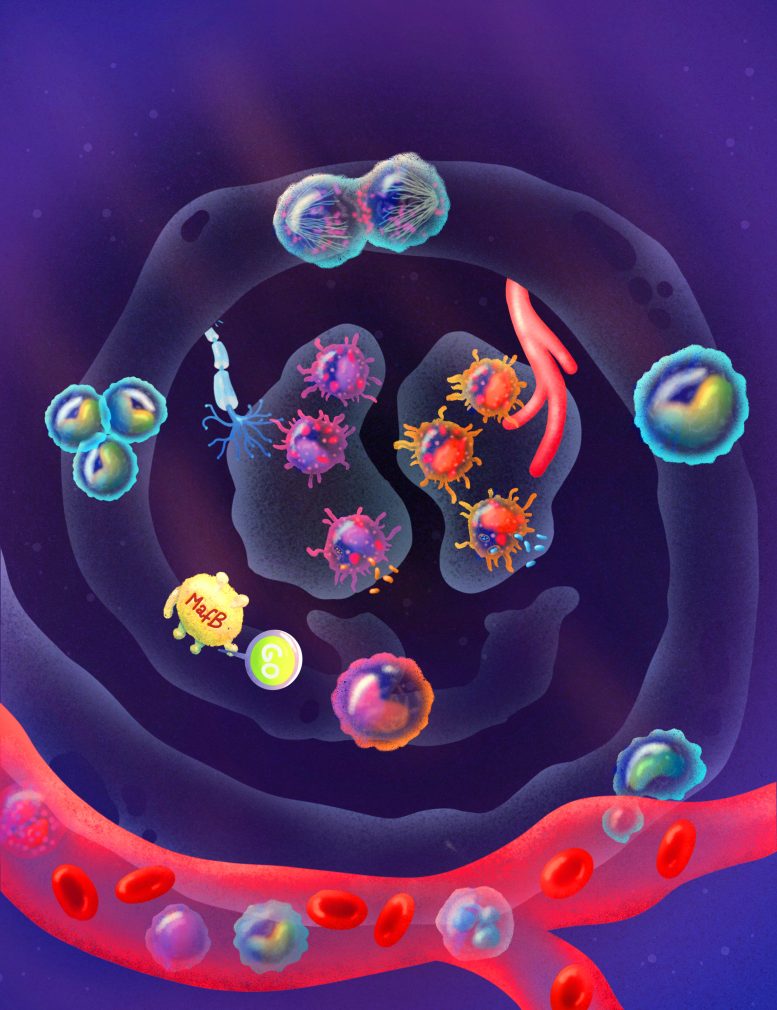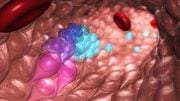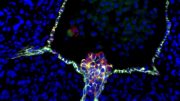
The illustration shows the new function of blood monocytes, namely their ability to proliferate in tissues before differentiating into macrophages, immune cells that play important roles in maintaining body homeostasis and health. Credit: Adeline Deward – Illumine
A recent study led by scientists from the University of Liège indicates a heightened role of cell proliferation in the functioning of our immune system.
Cell division, or proliferation, is crucial for life, facilitating the evolution of complex organisms from a single cell and the renewal of expended cells from a handful of “stem” cells that multiply and specialize. In the context of cancer, however, this cell proliferation spirals out of control and becomes chaotic.
A team of researchers at the University of Liège’s GIGA Institute has uncovered that specific blood immune cells known as monocytes in a healthy person also possess the capacity to proliferate. Their purpose is to replenish tissue macrophages, which are vital for our bodies to function correctly. These findings were recently published in the journal Nature Immunology.
The formation of complex multicellular organisms, which human beings belong to, requires the generation of billions of cells from a limited number of progenitor cells that have first proliferated and then acquire particular morphologies and functions while assembling into tissues and organs. Our current knowledge indicates that most of the cells that constitute a living organism arise from so-called “stem” cells, which have been divided by a process called mitosis in order to give rise to a greater number of cells. These cells then stop proliferating to specialize, differentiate and form muscles, the brain, bones, immune cells, and more.
When proliferation is no longer properly regulated, this can lead to the development of various diseases, among which cancers represent the most striking example. In a study published in Nature Immunology, Professor Thomas Marichal (Professor at ULiège, Welbio investigator at the WEL Research Institute) and his team from the GIGA Institute at ULiège discovered that this ability to proliferate is not merely restricted to stem cells, but is also an as-yet-unknown function of blood immune cells, the monocytes. Indeed, blood monocytes, previously considered as differentiated cells, are capable of proliferating and generating a pool of monocytes in the tissues in order to give rise to macrophages, which are important immune cells that protect us against microbes and support the proper functioning of our organs.
“This is a major fundamental discovery, which changes our conception of the involvement of cell proliferation in the constitution and maintenance of our immune system,” explains Thomas Marichal, director of the study. “Our finding also suggests that the information that can be drawn from an enumeration of blood monocytes, classically carried out during a blood test, would reflect only little of what is happening at the level of the tissues, during ‘infection or inflammation, for example, since monocytes can proliferate when they enter tissues.”
He also adds: “Fortunately, this proliferation is extremely well controlled and does not lead to a tumoral process. It has only one goal: to allow, as effectively as possible, the replacement of immune cells that populate our tissues: the macrophages.”
This discovery, funded by the WEL Research Institute (WELRI – Welbio) and by the European Research Council was possible thanks to the development of new tools and the use of innovative technologies.
“This study is a great example of how technological advances can drive breakthrough scientific discoveries. It would have been extremely difficult, if not impossible, to study with such a resolution this population of proliferating monocytes only 10 years ago. This required the use of state-of-the-art equipment recently acquired at the GIGA Institute, the generation of complex genomic data and very sophisticated bioinformatics analyses” explains Domien Vanneste, funded by a doctoral grant from the FNRS and first author of the study.
This study paves the way for future investigations that will evaluate the possibility of manipulating or controlling monocyte proliferation for therapeutic purposes, for the benefit of enhanced health.
Reference: “MafB-restricted local monocyte proliferation precedes lung interstitial macrophage differentiation” by Domien Vanneste, Qiang Bai, Shakir Hasan, Wen Peng, Dimitri Pirottin, Joey Schyns, Pauline Maréchal, Cecilia Ruscitti, Margot Meunier, Zhaoyuan Liu, Céline Legrand, Laurence Fievez, Florent Ginhoux, Coraline Radermecker, Fabrice Bureau and Thomas Marichal, 16 March 2023, Nature Immunology.
DOI: 10.1038/s41590-023-01468-3
The study was funded by the funded by the WEL Research Institute (WELRI – Welbio) and by the European Research Council.









Be the first to comment on "Scientists Discover Unexpected Function of Blood Immune Cells"